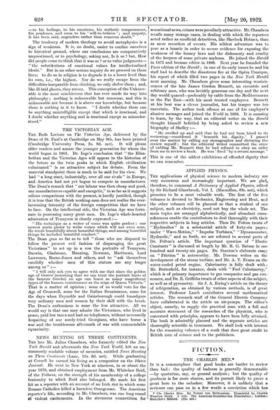NEWS HUNTING ON THREE CONTINENTS.
Tan late Mr. Julius Chambers, who formerly edited the New York Herald and afterwards the New York World, left an un- commonly readable volume of memoirs, entitled News Hunting on Three Continents (Lane, 12s. 6d. net). While graduating at Cornell he earned his living as a compositor on the Ithaca Journal. He went to New York at nineteen, in or about the year 1870, and obtained employment from Mr. Whitelaw Reid, of the Tribune, on the strength of his membership of a college fraternity to which Reid also belonged. He made his first hit as a reporter with an account of an Irish riot in which some Roman Catholics killed a harmless Orangeman. The American _reporter's life, according to Mr. Chambers, was one long round of violent excitements. In the strenuous competition for sensational news, crimes were peculiarly attractive. Mr. Chambers recalls many strange cases, in dealing with which the reporters acted rather as unofficial detectives, like Sherlock Holmes, than as mere recorders of events. His wildest adventure was to pose as a lunatic in order to secure evidence for exposing the weakness of the lunacy laws and the dishonesty and cruelty of the keepers of some private asylums. He joined the Herald in 1873 and became editor in 1886. Next year he founded the Paris edition of the Herald ; in one of its early issues he and his staff had to describe the disastrous fire at the Opera Comique, his report of which filled two pages in the New York Herald next morning. Mr. Chambers gives some interesting reminis- cences of the late James Gordon Bennett, an eccentric and arbitrary man, who was lavishly generous one day and the next day would quarrel—preferably by cable from the Mediterranean or the Far East—with his most trusted employees. Bennett at his best was a clever journalist, but his temper was too uncertain. The author took offence at one of his employei's abusive messages and joined the World in 1888. It is amusing to learn, by the way, that an editorial writer on the Herald thought himself belittled by being asked to review a new biography of Shelley :—
" He swelled up and said that he had not been hired to do reviewing—considered it ' beneath his dignity.' I passed over the matter by calling my stenographer and dictating the review myself ; but the editorial writer committed the error of cabling Mr. Bennett that he had refused to obey an order from me to review a book. He was ' fired ' by a return message."
This is one of the oddest exhibitions of offended dignity that we can remember.


































 Previous page
Previous page